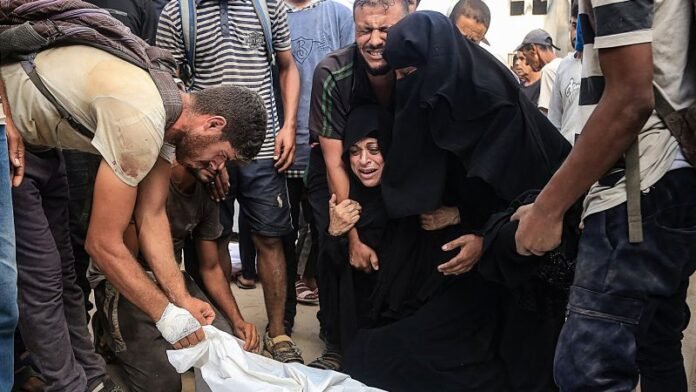CNN
—
Israeli troops opened fire on Gazans seeking food aid in the territory, killing at least 32 people, the Palestinian health ministry and witnesses said.
The ministry said that the bodies had been brought to Nasser Medical Complex, along with dozens of injured people.
CNN video from the hospital showed lines of bodies. One man, holding his dead son, said: “He just wanted to eat, what could I do?”
It’s unclear exactly where the shooting took place. One eyewitness, Hisham Dargam, said it had occurred some 4 kilometers (2.5 miles) from an aid distribution point run by the Gaza Humanitarian Foundation, the controversial Israeli- and US-backed organization.
“Gunfire erupted from soldiers and tanks, as if they were in a battle with us,” he said.
The Israeli military said troops had “identified suspects who approached them during operational activity in the Rafah area” about one kilometer from the aid site “at night-time when it’s not active.”
The Israel Defense Forces said troops fire warning shots and was investigating reports of casualties.
The GHF denied there were any incidents “at or near” any of its distribution sites on Saturday.
“The reported IDF activity resulting in fatalities occurred hours before our sites opened and our understanding is most of the casualties occurred several kilometers away from the nearest GHF site,” it said. The GHF added that it had repeatedly warned those seeking aid not to travel to its sites overnight or in early morning hours.
However, many Gazans have told CNN that they have to travel to distribution points several hours before they open to have a chance of receiving aid. Food in the strip is scarce, and people are starving, according to multiple UN assessments.
Most Gazans also have no means of transportation to travel to GHF centers, so have to walk long distances to reach the sites.

A doctor at the Nasser hospital, Travis Melin, said that many of the victims Saturday had “severe” gunshot wounds to the torso and head.
Hundreds of people have been killed while trying to access aid in Gaza since the GHF – a private group – began operating in the Strip in May, according to the UN High Commissioner for Human Rights. Nearly 800 people were killed in this way between late May and July 7, it said, 615 of whom were killed near GHF sites.
“Food here is a luxury of the privileged,” Dr. Melin told CNN. “If you’re lucky enough to have some money left, you’re the only people that can afford actual food. Everyone else is going to these massacre sites… even though they know it comes with this incredible amount of danger,” he added.
The director of communications for UNRWA, the United Nations agency that provides relief to Palestinian refugees, told CNN that the current aid distribution system in Gaza is a “death trap for starving Palestinians” calling for the organization to again be allowed to lead aid efforts.
Meanwhile, US President Donald Trump struck an optimistic note regarding ongoing ceasefire talks between Israel and Hamas.
“In Gaza, we got most of the hostages back,” he said on Friday evening. “We’re going to have another ten coming very shortly, and we hope to have that finished pretty quickly, and (Middle East Envoy) Steve Witkoff has been fantastic, he’s done a great job in that.”
Despite Trump’s positive outlook, the two parties to the conflict are again blaming one another for another faltering round of ceasefire talks, releasing statements on Friday accusing the other of dragging their feet in negotiations.
Hamas warned that it “cannot guarantee” that it will agree to any pauses to the conflict in the future if Israel does not agree to work towards a full end to the war in the current round of talks.
In the past, Israel has not been keen to agree to any permanent ceasefire, stating that it wants to continue fighting in the Gaza Strip until Hamas is eradicated.
Hamas spokesperson Abu Obaida said that, if Israel does not comply with its demands, the militant group could also not guarantee that it would release 10 living hostages as a part of the ceasefire deal.
“It has become clear to us that (Israeli Prime Minister Benjamin) Netanyahu’s government is not genuinely concerned about the captives, simply because they are soldiers,” he continued.
An Israeli official told reporters that one key sticking point in the talks is Hamas’ refusal to discuss what negotiators have dubbed the “release key” – the criteria and ratio through which individuals are identified for release in a swap – until there is a finalized agreement on where Israel will position its troops.
Israel is willing to be flexible in talks, the source said, accusing Hamas of “foot-dragging.”
